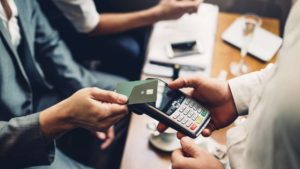
By Lamin Fatty, FCCA
We accountants have a reputation for being cautious. When it comes to using contactless credit and debit cards, perhaps that caution is well-founded.
The starting point is that contactless seem to serve no purpose beyond saving between five-to-10 seconds on a transaction. The last sentence might seem naïve, given that so many people seem unable to remember their pin numbers, but frankly, if someone is unable to remember a four-digit number that they use on a constant basis, are they really safe to be let loose with a credit card?
One of the main reasons for using these cards has always been that they were secure. If you carry cash around, it could get stolen or with the shiny new plastic tenners, bounce merrily out of pockets.
Cards might get stolen, but even when they did, banks would usually cancel them and they would be no use unless someone can get a pin number or, more rarely these days, forge a signature.
Contactless is completely different. Effectively, anyone can beg, steal or borrow your card and make hay while the sun shines (and what a wonderful summer it has been). The argument is that with a limit of £30 per transaction, nobody cares too much about the amount that they lose. That is a pretty weak attitude to fraud.
In any event, £30 is only the tip of what could be quite a large iceberg. I typically carry around not only a debit card and a credit card but also a second credit card, as the first one can be a little temperamental and it is embarrassing to be stuck in a restaurant with no means to pay.
My bank has recently added cashless to my main credit card without consultation. As a result, now if anybody steals my wallet, they can instantly purchase £90 of goods. In a shopping centre they could probably multiply this up tenfold within an hour, although possibly bank security may step in at some point (or possibly not).
There is also a much greater risk of temptation and casual theft. It might be showing a very negative (ie accountant-style) view but it would be extremely easy for the kids or others to borrow your card and spend the odd £30 now and then, quite possibly without your even noticing it. That is ignoring the wilful a fraudster with a scanner who gets up close and personal, skimming cards to your cost.
I haven’t personally had any experience of fraud of this type yet but it must be a regular occurrence. One issue is that many may not bother to try and get their money back if the amounts involved are relatively small. However, it would come as no surprise to learn that banks are beginning to play hardball and saying that any fraud involving contactless must be due to negligence by their customer, unless the theft has been reported to the police. That would seem to be a perfectly reasonable attitude and potentially moves liability from the banks to you and me.
In some ways, it would be good if this article led to indignant responses from banks, other accountants and any general readers, since there must be some wonderful benefits to contactless that this writer has completely overlooked.
